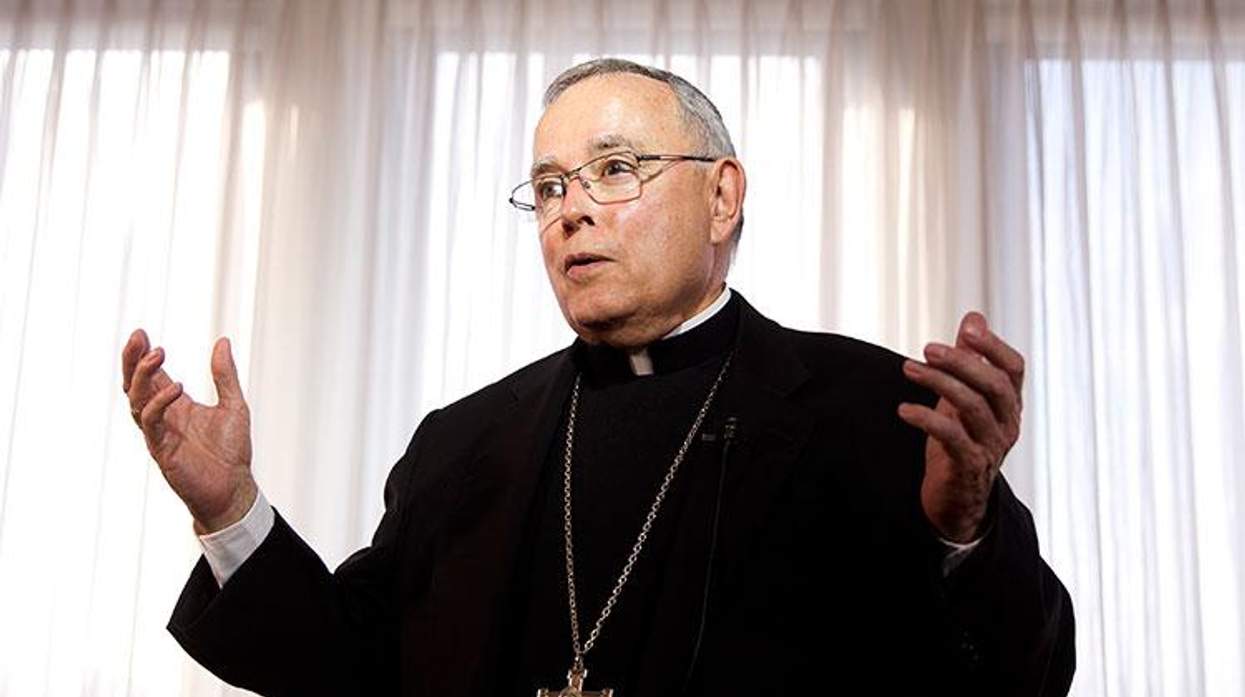Philadelphia Roman Catholic Archbishop Charles Chaput is drawing the ire of LGBT and liberal Catholics with his pronouncement that people in "irregular" relationships, including same-sex ones, must refrain from sex if they are to receive communion or participate in certain other church activities.
Chaput released the instructions to church members and clergy Friday, saying they implement a church document called Amoris Laetitia, or The Joy of Love, that came out of the Vatican in April.
"Acknowledging that it is a 'hard teaching,' Chaput goes on to say that Catholics in same-sex partnerships, those remarried without a church annulment, and cohabitating persons may not serve on parish councils, instruct the faithful, serve as lectors, or dispense Communion," reports The Inquirer, a Philadelphia daily.
Philadelphia appears to be the first diocese or archdiocese to set policies based on Amoris Laetitia, the paper reports, noting that others may issue more liberal instructions. But Chaput, as chair of the U.S. Conference of Catholic Bishops' committee on implementing Amoris Laetitia nationally, may try to spread the teachings.
In the document, Pope Francis "is clearly open to the possibility of divorced and remarried Catholics receiving Holy Communion," Rev. Thomas Reese, a columnist for the National Catholic Reporter, told The Inquirer. "But I think he'd also leave this to the discretion of the local bishop, which means that Chaput can do what he wants in his diocese, but a neighboring bishop may take a much more open position."
Amoris Laetitia is an apostolic exhortation, meaning it is not as strong a statement as an encyclical "but is viewed as a major teaching of the church," The Inquirer notes.
There have been instances of partnered gay Catholics being denied communion in various U.S. cities, with some of the denials coming even at funerals. The church holds that acting on same-sex desires is a sin, and that teaching is cited by clergy who have denied communion or other sacraments to people in same-sex relationships. But many Catholics in such relationships do receive the sacraments and are active in their parishes, often filling the roles Chaput would bar them from.
"I wonder how they tell if straight people are following the sexual rules of the church," Michael Rocks, president of the Philadelphia chapter of the LGBT Catholic group Dignity, told The Inquirer. "How do they tell if the president of the parish council isn't into child pornography or having a sexual relationship?"
Francis DeBernardo, executive director of New Ways Ministry, another LGBT Catholic organization, also objected to Chaput's instructions. "Chaput's directives are distinctly at odds with the tone and recommendations of Amoris Laetitia which stressed church leaders should provide pastoral accompaniment and encounter, as well as encouragement, instead of discipline," he said in a written statement.
Chaput's move "is just one more attempt to hold oan to a model of church which has long been rendered obsolete," DeBernardo added. He said he was somewhat concerned that parishioners would take it upon themselves to report violations of the directives, but he predicted most people would ignore the instructions. And there will likely be a backlash, he said, rendering conservative churchmen like Chaput ever-more irrelevant.
The fact that Chaput chairs the bishops' committee on national implementation is not a good sign, DeBernardo said, but he added that if what comes out of this committee is too conservative, it too will be ignored.
"Since Chaput represents the most conservative wing of the U.S. church, it is unlikely that any recommendations which emerge will be useful to most bishops, who will likely take a more compassionate approach to implementing the apostolic exhortation than the narrow one that Chaput has offered," DeBernardo concluded.




































































Charlie Kirk DID say stoning gay people was the 'perfect law' — and these other heinous quotes